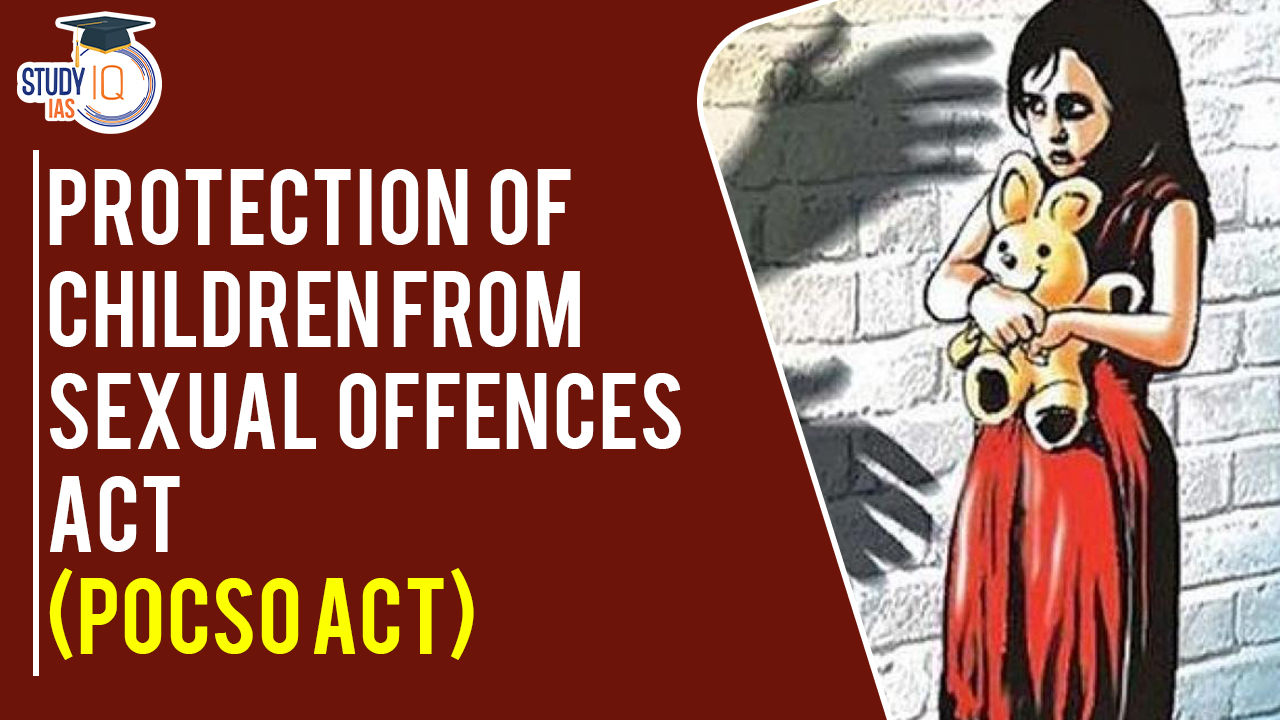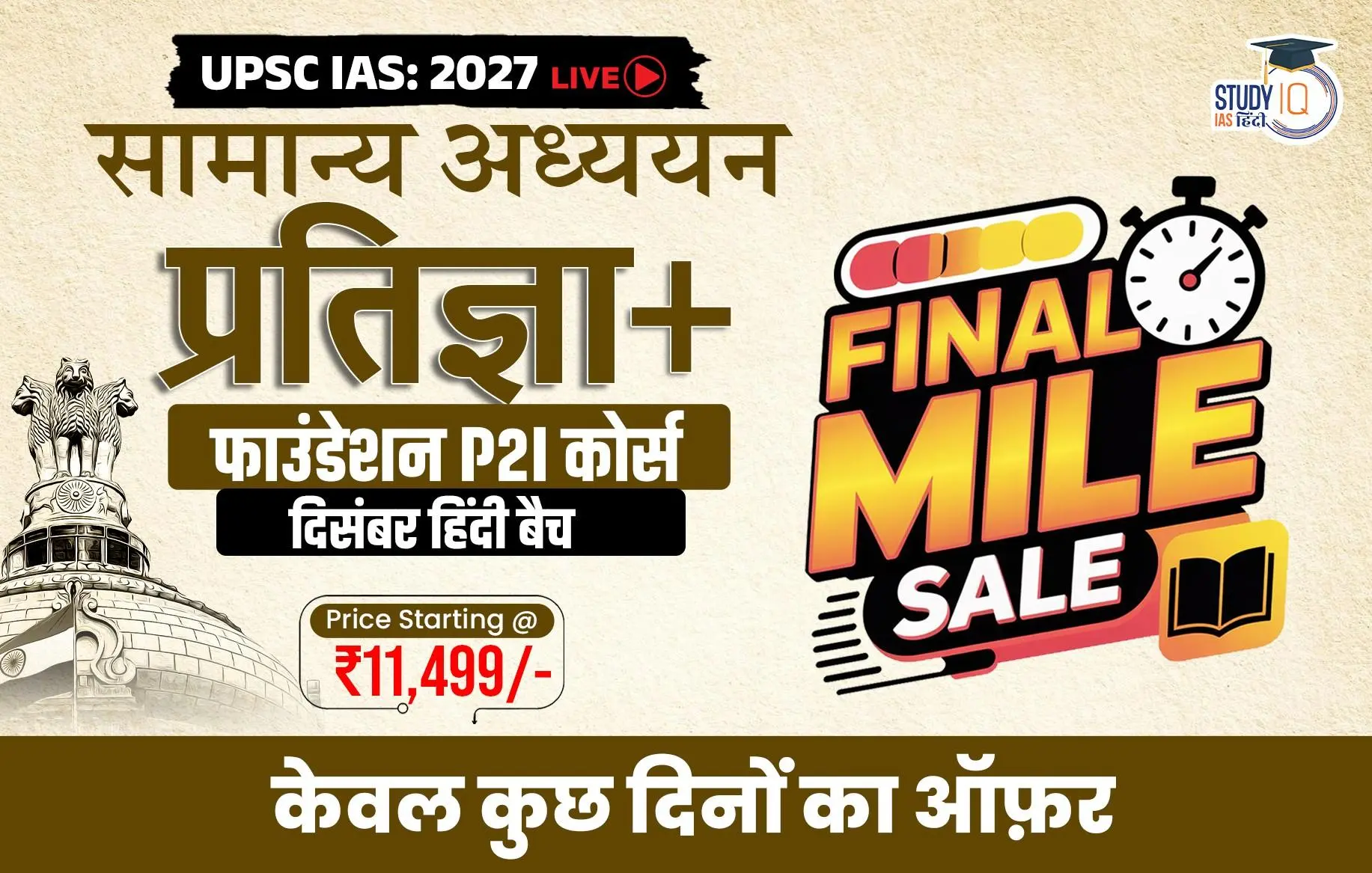Table of Contents
Context: The Supreme Court chose not to sentence a man convicted under the POCSO Act, acknowledging that the victim herself didn’t perceive the incident as a crime and experienced greater distress from the legal proceedings.
What is POCSO Act 2012?
To make our nation’s children’s surroundings safer, the POCSO Act 2012 was a significant step. It was implemented to safeguard kids from child pornography and other sexually explicit crimes, including sexual harassment and abuse. In order to deal with such offences more effectively, this act calls for the establishment of Special Courts.
| Protection of Children from Sexual Offences Act ( POCSO ACT) | |
| POCSO Act Full Form | Protection Of Children from Sexual Offences Act |
| Year | November 14, 2012 |
| What does the POCSO Act stand for? | An Act to Prevent Sexual Assault, Sexual Harassment, and Pornographic Offences Against Children and Establish Special Courts to Try Such Offences and Matters Related Thereto or Incidental Thereto |
| Age Limit | Under this law, minors under the age of 18 are protected. |
| Punishment | The minimum punishment under the act is 10 years. |
Key Features of POCSO Act
- Confidentiality of the victim’s identity: The act lays down a protocol for the media and prohibits disclosure of the victim’s identity, except when permitted by the Special Courts established under the act.
- A gender-neutral law: The act defines a child as “any person” below 18 years of age.
- Different forms of sexual abuse: The Act clearly explains and distinguishes between different forms of sexual abuse, including non-penetrative and penetrative assault, sexual assault and aggravated sexual assault, among others.
- No time limit for reporting abuse: A victim can report an offence at any time, even several years after the incident of abuse.
- Consent under POCSO: The POCSO Act criminalises all sexual activity for those under the age of 18, regardless of whether consent is factually present between the two minors in a particular case or not.
- Establishment of Special Courts for trial of POCSO cases: To provide speedy delivery of justice. The act stipulates that cases should be disposed of within a year.
Amendment in POCSO Act (2019)
- It introduced the death penalty for the offence of aggravated penetrative sexual assault.
- It introduced offences for transmitting or propagating pornographic materials involving a child.
Provisions of POCSO Act
Monitoring and enforcing this law are the responsibilities of the Standing Committee for the Protection of Children’s Rights (SCPCR) and the National Commission for the Protection of Children’s Rights (NCPCR). It provides the generally recognised definition of a child, which includes kids of both sexes and everyone under eighteen.
| National Commission for Protection of Child Rights (NCPCR) |
|
Crimes should be reported, evidence gathered, inquiries made, and trials conducted in a child-friendly manner. Hearing the child’s testimony, ideally by a female police investigator not below the rank of sub-inspector, in their home or another venue of their choosing. A youngster cannot ever be kept overnight in a police station.
Interpreters need to be present to break down language barriers. An exceptional teacher or someone familiar with the child’s speaking style should be current if the child is disabled. The statement made by the youngster should be recorded verbatim. When recording the children’s testimony, the law enforcement official should be dressed casually to lessen their fear of police.
The offence and the child’s mental health should be considered when determining the severity of the fine and penalty. It creates specialised courts to handle the prosecution of such offences. The trial should be taken quickly and concluded within a year. The child will not be the target of an aggressive interrogation or verbal abuse. The child’s physical examination must occur before the legal guardian or another person with the child’s trust and respect. Long-term and brief therapy is offered through the Child Welfare Committee and the Juvenile Court Commission.
POCSO Act Constitutional Provision
Every child is guaranteed the right to live a life of dignity and the right to privacy under Articles 21 and 24, as well as the rights to equality under Articles 14 and 15, protection from discrimination under Article 15, and protection from exploitation under Articles 23 and 24 of the Indian Constitution. It establishes the right to an elementary education under Article 21A for children between six and fourteen.
The Directive Principles of State Policy’s Article 39(f) requires state governments to ensure that children have equitable access to opportunities and resources to enjoy childhood and adolescence free from exploitation.
Importance of POCSO Act
India has one of the largest populations of people under 18; the 2011 census indicated that there were 472 million such people in the country. Extending protection to this group of people who are already vulnerable is crucial to the nation’s functioning.
If Article 21 is carefully analysed, one of the guarantees the State must uphold is the protection of children. India also ratified the United Nations Convention on the Rights of the Child. Specific regulations must be implemented to protect children’s interests and their carefree childhood.
Before the POCSO Act’s implementation, the Constitution’s provisions for handling sexual offences against children were woefully inadequate. The Goa Children’s Act of 2003 was the only law to address child abuse specifically. These sections of the Indian Penal Code (IPC) handled the prosecution of all sexual offences and wrongdoings committed against children.
- IPC (1860) 377- Unnatural offences
- IPC (1860) 375- Rape
- IPC (1860) 354- Outraging the modesty of a woman
Since this strategy had plenty of problems, few rules specifically catered to the children’s best interests. It had several flaws that made it impossible to provide children with adequate and effective protection they needed, notably the fact that IPC 375 does not shield male victims from sexual offences involving penetration.
The Constitution’s definition of “modesty” is distinctly ambiguous. Because it is not a compoundable offence, its violation has little impact on the punishment. Additionally, it doesn’t protect a boy’s modesty. ‘Unnatural offences’ were not defined under IPC 377, overturned in the historic 2018 decision. It was restricted to the sexual act of the attacker and did not consistently criminalise sexual acts against children.
These inconsistencies and inadequate safeguards justified the desire for reform, which was motivated by the need to protect children from such crimes. Consequently, the POCSO Act was put into effect.
POCSO Act Salient Features
POCSO Act age limit is for those who are under the age of 18 according to the statute. This act has a gender-neutral position; hence, the issue of gender exclusion in the prior acts was completely ignored. This law defines sexual abuse in a variety of ways that go beyond pornography, harassment, and penetrative or non-penetrative offences.
If the child is mentally ill and/or the perpetrator comes from a place of power and/or trust, such as a family member, doctor, teacher, etc., these crimes would be seen as “aggravated.” Since the POCSO Act permits a police officer to intervene in the capacity of a child protector throughout the inquiry, it is crucial to prevent “re-victimisation” of the child within the legal system.
The inquiry procedure must be as kid-friendly as possible, and justice must be swiftly administered within a year of the incident being reported. Under this act, “Special Courts” have been established, which will only handle these offences with the care and sensibility they require. The 45th section of the statute grants the central government the power to enact regulations.
The responsibility for overseeing the application of the provisions of the act has been delegated to the State Commissions for the Protection of Child Rights (SCPCRs) and the National Commission for the Protection of Child Rights (NCPCR). These two powers both have a legal basis. According to section 42A, instances where one provision conflicts with another would be resolved in favour of the POCSO Act. The act mandates that sexual offences be reported. The use of these laws improperly for the aim of defaming a person is prohibited.
POCSO Act General Principle
The 2012 Protection of Children from Sexual Offences Act included 12 fundamental concepts. All parties, including the state governments, child welfare committees, the Special Courts, and the Police, must abide by these. The following is a list of these 12 guiding concepts;
- Best Interest of the Child: The child’s holistic growth is the most important aspect of the procedure.
- Right to Life and Survival: The child shall be protected from all forms of psychological, physical, emotional, and mental harm in the most effective way possible.
- The right to be shielded from discrimination: Discrimination on any basis shall not accompany the administration of justice. It needs to be clear.
- Right to be treated with respect and compassion: Under the terms of the POCSO Act, victims must be given careful consideration at all times.
- Right to information: Children who are witnesses or victims of crimes should be given a full explanation of the legal process.
- Right to specific preventative measures: Because it’s more likely for abused children to experience abuse again than it is for them not, and because prevention is preferable to treatment, this act took preventive measures very seriously.
- The right to competent assistance: The legal system may be traumatic for a person in many ways, which is why many crimes go undetected, since the emotional and financial costs are frequently too significant. Because of this, the statute includes legal, medical, counselling, psychological, and economic provisions.
- Children have the following rights: The right to be heard and to express opinions and concerns them.
- Right to be safeguarded from hardship during the justice process: When a child is involved in the legal system, there is a very real secondary victimisation that takes place. We want to minimise this.
- The POCSO Act of 2012 mandated that a child’s identity and privacy be secured at all phases of the trial, pre-trial, and post-trial, because cases might become very public.
- Right to compensation: A child’s relief and rehabilitation must be reimbursed.
- Right to safety: Whether during or after a trial, the protection of children is essential.
Challenges in Implementation of POCSO Act
- Underreporting of Cases: Despite mandatory reporting provisions, many cases go unreported due to social stigma, fear of retaliation, and lack of awareness, especially when the perpetrator is a family member or known to the child.
- Judicial Delays: Although the Act stipulates that trials should be completed within a year, in practice, cases often take much longer, sometimes over 500 days, due to overburdened courts and a lack of infrastructure.
- Eg., As of 2021, 77.77% of POCSO cases in Uttar Pradesh were pending; Delhi had an average case length of 1,284 days.
- Low Conviction Rates: The conviction rate under POCSO is relatively low, with a significant number of acquittals.
- Factors contributing to this include inadequate investigation, lack of evidence, and the victim turning hostile during the trial.
- Eg., As per the “A Decade of POCSO” study, 43.44% of POCSO trials end in acquittals, while only 14.03% lead to convictions.
- Inadequate Support Services: There is a shortage of trained professionals, such as child psychologists and counsellors, to provide necessary support to victims.
- Moreover, the appointment of support persons, as mandated by the Act, is often neglected.
- Eg., In 96% of cases, victims were not provided with a ‘support person’, despite clear provisions. (A Decade of POCSO” study)
- Criminalisation of Consensual Adolescent Relationships: The Act does not distinguish between exploitative sexual abuse and consensual relationships between adolescents, leading to criminalisation of the latter.
- Lack of Sensitisation and Training: Investigating officers, prosecutors, and judges often lack training in child-friendly procedures and trauma-informed handling.
- Insensitive cross-examinations and courtroom procedures can retraumatize victims.
Way Forward (Suggestion by SC)
- Reconsider Criminalization of Consensual Adolescent Relationships: The SC has urged the Government of India (GoI) to review whether consensual romantic/sexual relationships between adolescents (typically aged 16–18) should fall within the purview of the POCSO Act.
- The Court observed that penalizing teenagers in consensual relationships contradicts their developmental needs and emotional maturity.
- Decriminalization of “Young Love”: The POCSO Act intends to protect minors from sexual exploitation, not to punish adolescents engaging in natural, consensual, and non-exploitative relationships.
- The Court pointed out that a rising number of POCSO cases involve consensual relationships, often prosecuted due to complaints from disapproving parents or families.
- Framing a Comprehensive Sexual and Reproductive Health Education Policy: The Supreme Court recommended the formulation of a national policy on sexual and reproductive health education.
- This policy should:
- Educate adolescents about healthy romantic and sexual relationships.
- Be progressive, inclusive, and sensitively framed.
- Involve consultations with stakeholders, including educators, psychologists, healthcare experts, and communities.
- Be institutionally supported rather than becoming a bureaucratic formality.
- This policy should:
- Promote Counselling Over Criminalization: The SC highlighted the need for counselling and psychological guidance to help teenagers understand emotional intimacy and sexual health, rather than subjecting them to criminal prosecution.


 SLAPP Suits: Meaning, Examples, Impact o...
SLAPP Suits: Meaning, Examples, Impact o...
 Finance Commission of India, Articles an...
Finance Commission of India, Articles an...
 High Number of Pending Cases in Supreme ...
High Number of Pending Cases in Supreme ...

























